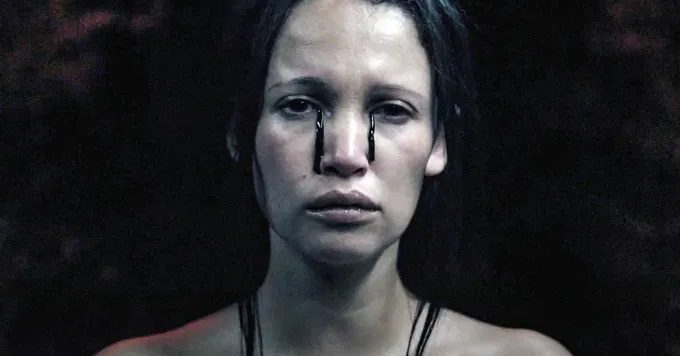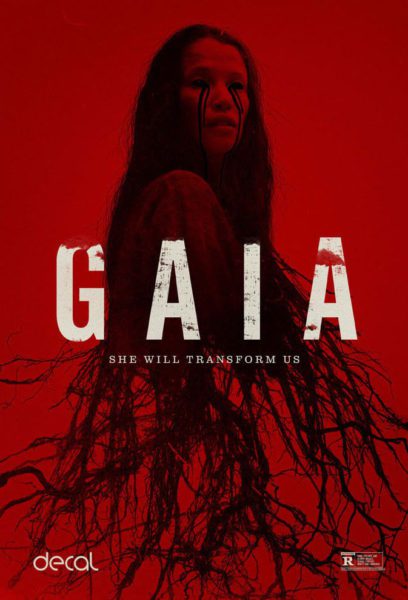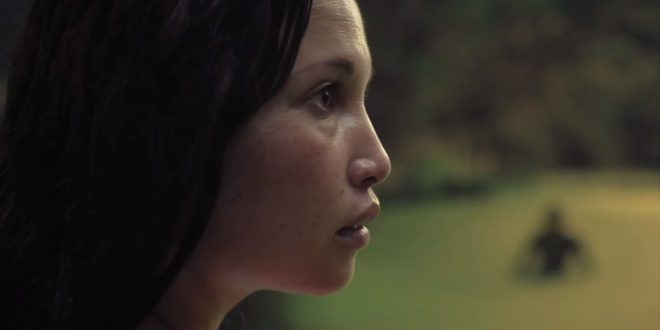Watching the trailer for Jaco Bower’s Gaia, it would be easy to assume this is just a Last of Us fan film with its ragged survivalist types struggling to survive against fungus beasties. However, I would encourage you to give it a second look as I did.
Synopsis for Gaia:
A park ranger takes shelter with two survivalists after an attack by mysterious creatures in a primordial forest.
Like I said in the intro, at first glance, this film would seem to have a lot of similarities to the Playstation hit game, The Last of Us, on a superficial level, but looking at it with a critical eye, Gaia has a lot more going on underneath the topsoil. Besides being nearly unanimously declared eco-horror by other critics, this film is also a psychedelic blend of body horror and an observation of the cyclical nature of human history, especially in regards to gender relations.
From the outset, the film has a deep connection to the feminine perspective. From our strong female protagonist, Gabi (Monique Rockman), being a badass park ranger suddenly thrown out of her element in the wilds she thought she knew, to the camera’s lingering close-ups on her to make clear her tactile feelings of the situation, to the yonic imagery, to the title itself, to the mythological name for the spirit of Mother Earth, Gaia strives to analyze femininity.

Speaking of the film’s imagery, it’s some of the most gripping and haunting I’ve ever seen in modern horror. From the psychedelia to the macro shots of nature in its beauty and horror, cinematographer Jorrie van der Walt captures the fine line between surreal and real, dream and reality. While a lot of other critics seem fixated on In the Earth (read our review here) for psychedelic eco-horror, I feel like the collaboration between van der Walt and Bower actually accounts for each of the insert being a piece of the narrative puzzle here, where the former used them largely to fill time and disorient the audience. Van der Walt’s cinematography shines in the macro shots of nature, pointedly (and terrifyingly at times) showing the similarities between the human body and growth of plant life. Several of these shots made me squirm, even on a second viewing.

Gaia discusses the cyclical nature of humanity and takes a haunting jab at older gender roles. Gabi is protective and badass but Barend (Carel Nel) doubts and undermines her at every turn, from her determination to return to civilization to his fanatical beliefs to her survival skills as a park ranger. Both Barend and his son, Stefan (Alex van Dyk), are defined by their relations to and actions toward women.
Stuck with the two, she is forced by the situation out of her self-determined and independent role and into what the men want. She’s a twisted combination of the Mother and Lover archetypes for Stefan, stealthily teaching him about the normal world outside the park behind Barend’s back while he seems to lust after her. Meanwhile, Barend switches between wanting her as a pupil and seemingly wanting her dead. The whole time, the park itself is alive and seems to want them all subservient… or even dead.
Final Thoughts
Without spoiling the ending, Gaia didn’t quite stick the landing for this critic due to a sudden shift in character dynamic that didn’t get enough explanation to make sense. If there had been an extra 10 minutes of characterization for at least one or two of the cast, this gorgeously shot film could have been elevated to a modern classic. If you like green/eco-horror and psychedelia to help move along a story, or you’re just are a fan of good cinematography in horror, I would certainly recommend this film to you. Gaia is currently screening in select theaters and is available on VOD rental.

 PopHorror Let's Get Scared
PopHorror Let's Get Scared




